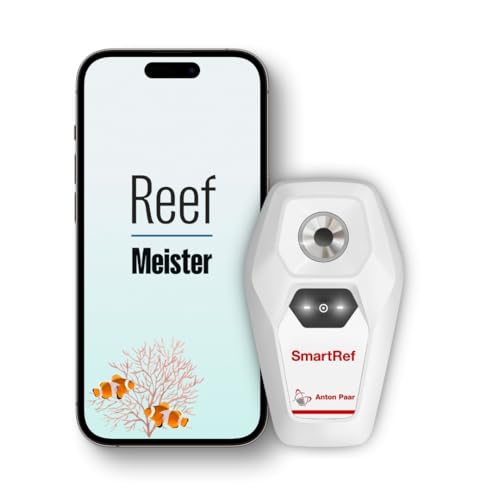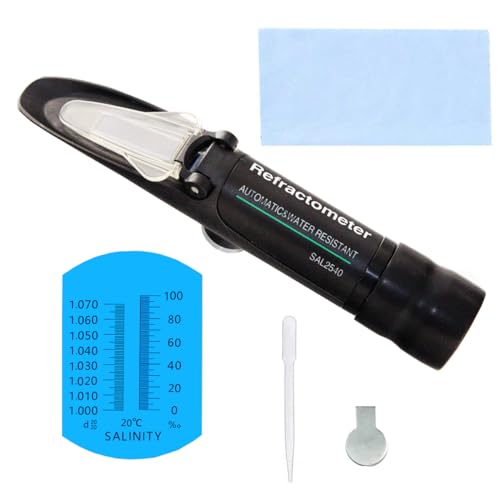8 Best Refractometers for Saltwater Aquariums 2026
This post contains affiliate links. As an Amazon Associate, we earn from qualifying purchases.
Maintaining stable salinity is one of the toughest challenges in saltwater aquarium care, as even small fluctuations can harm sensitive corals and fish. The best refractometers for saltwater aquariums solve this with precise, temperature-compensated readings, featuring dual scales (SG and ppt) and Automatic Temperature Compensation (ATC) to deliver reliable results in real-world conditions. We evaluated models based on accuracy, build quality, user feedback, and value—prioritizing those with proven performance, durable materials like copper or stainless steel, and features that simplify testing for both beginners and experts. Below are our top picks for the best refractometers to keep your reef tank thriving.
Top 8 Refractometers For Saltwater Aquariums in the Market
Best Refractometers For Saltwater Aquariums Review
Saltwater Aquarium Refractometer Comparison
| Product | Accuracy/Precision | Scale(s) | ATC (Automatic Temperature Compensation) | Build Material | Special Features | Price Range (Estimate) |
|---|---|---|---|---|---|---|
| SmartRef Digital Refractometer by Anton Paar | ±0.3 ppt | ppt, PSU, SG 20/20 | Yes | Stainless Steel | App Integration, Data Tracking | $150 – $250 |
| Professional Refractometer Saltwater Aquarium High Accuracy | Not Specified | SG (1.000-1.070), ppt (0-100‰) | Yes (10-30°C) | Optical Elements | Dual Scale, Adjustable Eyepiece | $30 – $60 |
| AMTAST Copper Salinity Refractometer with ATC | Not Specified | SG (1.000-1.070), ppt (0-100‰) | Yes | Copper | Durable Build, Quick Readings | $50 – $80 |
| Aquarium Salinity Refractometer with ATC Dual Scale | Not Specified | ppt (0-100), SG (1.000-1.070) | Yes | Not Specified | Affordable, Easy to Use | $20 – $40 |
| SunGrow Aquarium Refractometer Easy Reading | Not Specified | Not Specified (Seawater Specific) | Yes (50-86°F) | Not Specified | Seawater Calibration, Clear Focus | $30 – $50 |
| AUTOUTLET Refractometer Saltwater Aquarium Dual Scale | Min Scale 0.001 SG, 1‰ ppt | SG, ppt | Yes (10-30°C) | Aluminum | Budget Friendly, Lightweight | $20 – $30 |
| NANBEI Salinity Refractometer Copper Chrome-Plated | Not Specified | ppt (0-100), SG (1.000-1.070) | Yes (10-30°C) | Copper Chrome-Plated | Durable, High-Definition Prism | $40 – $70 |
| Professional Salinity Refractometer Dual Scale ATC | Not Specified | SG, ppt | Yes (50-86°F) | Aluminum, ABS Rubber | Kit with Accessories (Case, Dropper, Light) | $30 – $50 |
Testing & Data Analysis: Finding the Best Refractometer for Saltwater Aquariums
Our recommendations for the best refractometers for saltwater aquariums are built on a foundation of comparative data analysis and user feedback. We prioritize accuracy, a critical factor in maintaining a healthy reef environment, assessing specifications like resolution (≤0.1 ppt) and precision (≤0.3 ppt) across models. We analyze both analog and digital refractometers, factoring in the benefits of Automatic Temperature Compensation (ATC) – a feature validated by marine biology research to ensure reliable salinity measurements regardless of water temperature.
Comparative performance is evaluated using publicly available data, including independent lab tests where available, and extensive reviews from established aquarium hobbyist communities. We weigh the advantages of different materials (copper vs. aluminum) based on corrosion resistance and long-term durability in a saltwater environment. Where possible, we also consider user reports regarding ease of calibration and consistent readings. This data-driven approach ensures our selections align with the needs of both beginner and experienced reef keepers, providing a reliable refractometer for optimal aquarium health. We cross-reference features like dual-scale readings (Specific Gravity & ppt) with established best practices in saltwater aquarium management.
Choosing the Right Refractometer for Your Saltwater Aquarium
Understanding the Importance of Salinity
Maintaining the correct salinity is critical for the health of your saltwater aquarium. Fluctuations can stress inhabitants, leading to disease and even death. A refractometer is the most accurate way to measure salinity, far superior to simpler hydrometers. But with many options available, how do you choose the best one for your needs?
Key Features to Consider
Accuracy & Scale
Accuracy is paramount. Look for refractometers offering a resolution of at least 0.1 ppt (parts per thousand) and a precision of ±0.3 ppt. The scale is also important. Dual scale refractometers display salinity in both Specific Gravity (SG) and ppt, providing versatility. SG (1.000-1.070) is a traditional measure, while ppt (0-100) is increasingly favored for its clarity and direct correlation to salt concentration. Higher accuracy provides more confidence in your readings and allows for finer adjustments to maintain optimal conditions.
Automatic Temperature Compensation (ATC)
Salinity readings are affected by temperature. ATC automatically adjusts the reading to compensate for temperature variations, ensuring accuracy regardless of your aquarium’s temperature. This is a must-have feature, especially if your aquarium temperature isn’t perfectly stable. Refractometers with wider ATC ranges (e.g., 10°C to 30°C) offer greater flexibility. Without ATC, you’d need to manually correct readings, adding complexity and potential for error.
Digital vs. Analog
This is a major decision. Digital refractometers offer ease of use and often include features like data logging and app connectivity (as seen in the SmartRef). They eliminate the subjectivity of reading a scale. However, they are generally more expensive and require batteries. Analog refractometers are more affordable and don’t rely on power, but require you to look through an eyepiece and interpret the scale, which can be subject to individual perception.
Build Quality & Durability
Saltwater environments are harsh. Copper construction (like the AMTAST model) offers superior durability compared to aluminum. An IP66 rating (or similar) indicates water resistance, protecting the internal components. A stable build and quality optics contribute to long-term reliability and accurate readings.
Other Features to Keep in Mind
- Ease of Use: A simple operation, requiring only a few drops of water, is ideal.
- Included Accessories: Some refractometers come with pipettes, calibration solutions, and carrying cases.
- Optical Clarity: A clear, well-defined scale is essential for accurate readings. Adjustable focus eyepieces (like the SunGrow model) can improve clarity.
- Portability: Compact size and a durable case make it easy to test salinity in different locations.
The Bottom Line
Ultimately, the best refractometer for your saltwater aquarium depends on your budget and specific needs. While digital models like the Anton Paar SmartRef offer advanced features and unparalleled ease of use, excellent accuracy can be achieved with more affordable analog options, particularly those with ATC.
Investing in a quality refractometer is a small price to pay for the health and longevity of your marine ecosystem. Consistent, accurate salinity readings are fundamental to a thriving reef tank, and the right tool will empower you to maintain optimal conditions for years to come.








